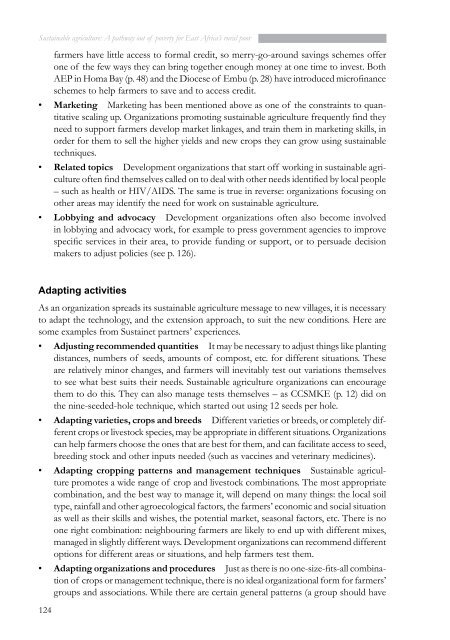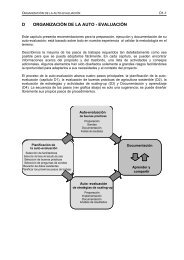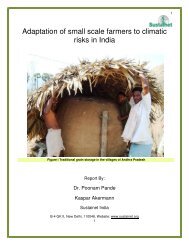cases from tanzania - Sustainet
cases from tanzania - Sustainet
cases from tanzania - Sustainet
You also want an ePaper? Increase the reach of your titles
YUMPU automatically turns print PDFs into web optimized ePapers that Google loves.
Sustainable agriculture: A pathway out of poverty for East Africa’s rural poor<br />
124<br />
farmers have little access to formal credit, so merry-go-around savings schemes offer<br />
one of the few ways they can bring together enough money at one time to invest. Both<br />
AEP in Homa Bay (p. 48) and the Diocese of Embu (p. 28) have introduced microfinance<br />
schemes to help farmers to save and to access credit.<br />
• Marketing Marketing has been mentioned above as one of the constraints to quantitative<br />
scaling up. Organizations promoting sustainable agriculture frequently find they<br />
need to support farmers develop market linkages, and train them in marketing skills, in<br />
order for them to sell the higher yields and new crops they can grow using sustainable<br />
techniques.<br />
• Related topics Development organizations that start off working in sustainable agriculture<br />
often find themselves called on to deal with other needs identified by local people<br />
– such as health or HIV/AIDS. The same is true in reverse: organizations focusing on<br />
other areas may identify the need for work on sustainable agriculture.<br />
• Lobbying and advocacy Development organizations often also become involved<br />
in lobbying and advocacy work, for example to press government agencies to improve<br />
specific services in their area, to provide funding or support, or to persuade decision<br />
makers to adjust policies (see p. 126).<br />
Adapting activities<br />
As an organization spreads its sustainable agriculture message to new villages, it is necessary<br />
to adapt the technology, and the extension approach, to suit the new conditions. Here are<br />
some examples <strong>from</strong> <strong>Sustainet</strong> partners’ experiences.<br />
• Adjusting recommended quantities It may be necessary to adjust things like planting<br />
distances, numbers of seeds, amounts of compost, etc. for different situations. These<br />
are relatively minor changes, and farmers will inevitably test out variations themselves<br />
to see what best suits their needs. Sustainable agriculture organizations can encourage<br />
them to do this. They can also manage tests themselves – as CCSMKE (p. 12) did on<br />
the nine-seeded-hole technique, which started out using 12 seeds per hole.<br />
• Adapting varieties, crops and breeds Different varieties or breeds, or completely different<br />
crops or livestock species, may be appropriate in different situations. Organizations<br />
can help farmers choose the ones that are best for them, and can facilitate access to seed,<br />
breeding stock and other inputs needed (such as vaccines and veterinary medicines).<br />
• Adapting cropping patterns and management techniques Sustainable agriculture<br />
promotes a wide range of crop and livestock combinations. The most appropriate<br />
combination, and the best way to manage it, will depend on many things: the local soil<br />
type, rainfall and other agroecological factors, the farmers’ economic and social situation<br />
as well as their skills and wishes, the potential market, seasonal factors, etc. There is no<br />
one right combination: neighbouring farmers are likely to end up with different mixes,<br />
managed in slightly different ways. Development organizations can recommend different<br />
options for different areas or situations, and help farmers test them.<br />
• Adapting organizations and procedures Just as there is no one-size-fits-all combination<br />
of crops or management technique, there is no ideal organizational form for farmers’<br />
groups and associations. While there are certain general patterns (a group should have




